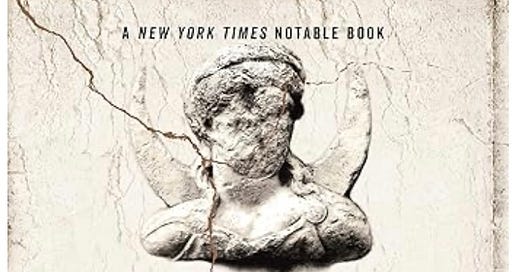Earlier this week, I finished the book “The Darkening Age: The Christian Destruction of the Classical World” by Catherine Nixey. And while Nixey is an engaging and accessible writer, the content of her book is gutting — especially if you are a polytheist and/or Pagan, both of which (as you no doubt know) I am.
Let me just start with the very last paragraph of the book to give you a sense of what I mean:
The lovely statue of Athena, the goddess of wisdom, suffered as badly as the statue of Athena in Palmyra had. Not only was she beheaded, she was then, a final humiliation, placed face-down in the corner of a courtyard to be used as a step. Over the coming years, her back would be worn away as the goddess of wisdom was ground down by generations of Christian feet. The “triumph” of Christianity was complete.
Oof!
Ouch!
In clear, compelling prose, Nixey lays out how, in its first 200 years in authority—from Emperor Constantine’s conversion to Christianity in 312 CE to the legal prohibition of any teachers who “labored under the insanity of paganism” in 529 CE—the Church led a concerted and sustained campaign to destroy pagan religion, culture, and people. In story after horrific story, Nixey lays out how Christian clergy and monks incited angry mobs of disaffected men to tear down temples and schools, burn libraries, and harass and beat to death pagan priests, philosophers, and adherents. The now-Christian Roman Empire and its client states passed laws making it harder and harder to worship in any way but the new Christian way.
In less than 50 years after Emperor Constantine converted and stated that all religions should be tolerated, offering sacrifices to the gods became punishable by the death penalty. In another 50 years or so, pagan ceremonies were outlawed with the same cost (execution) for those who led them.
To many of these early Church fathers, including Augustine of Hippo (354-430CE), whose followers often operated outside the law and were never punished, the terror visited upon the pagan public was the point: “Where there is terror, there is salvation . . . Oh, merciful savagery!”
I had to read this book in short spurts as I found myself angered and depressed by turns—not only because of tragedies of the past, but because of what we are facing today in the U.S. with the rise to power of authoritarian fascist would-be emperors, the destruction of our governmental institutions and the war on science perpetuated by DOGE, and the culture wars whipped up by Christian nationalists and white supremacists intent on dividing and controlling the masses. It was impossible not to see the parallels between then and now.
With less than 10% of all classical literature and knowledge surviving into the modern era, the history of the late Antique world rewritten and/or forgotten for centuries, and religious monotheist fanatics running roughshod above the law, I can only imagine in horror our future.
And of course, I wonder how we can preserve the scientific and medical knowledge we have gained in the last 200 years, how we can protect the rights and the lives of our most vulnerable and marginalized communities, and how we save ourselves and our Mother Earth—and if we even can.
I don’t have the answer to that, but I believe in witnessing and not turning away. And I recommend reading Nixey’s book and talking with your communities and your loved ones about these issues.
Blessings from a strong and open heart,






I have this book but haven't read it yet. So many books, so little time.
Sounds like a book to get if only for the bibliography. I’m putting this on my TBR list. :)